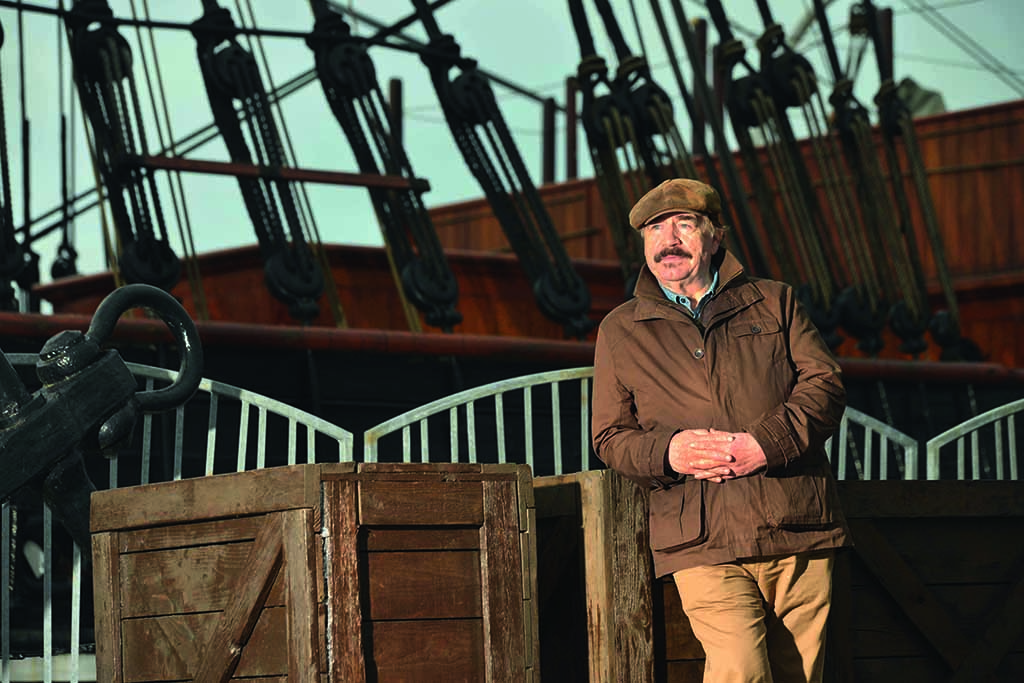
Actor Brian Cox on Dundee – the city of survival
Despite the blight of youthful poverty and the gutting of his home city by corrupt politicians, actor Brian Cox says that his beloved Dundee’s defining qualities – its warmth, humour and resilience – are behind its phoenix-like rise from the ashes.
In 2019, Dundee is one of the most vibrant cities in the UK, especially since the opening of the V&A Dundee.
One of its most famous sons is Brian Cox, famed as the original Hannibal Lecter, whose career spans credits as varied as Braveheart, The Bourne Identity, X-Men films, to voicing the spaghetti-faced Ood on Doctor Who.
In this interview, originally published in 2014, he tells Scottish field about growing up in the City of Discovery.
The first part of my life was great. I saw the first light of day in Brown Constable Street, on the east side of Dundee. Throughout the forties and fifties my playground was Arthurstone Terrace and I used to play in the old foundry there. Back then Dundee was a beautiful little medieval city.
From the age of five I used to walk to school, which was quite a way across main roads, but there was always a bobby at the bottom of the street.
Dundee was very green: all along the Victoria Road there were places like the Old Contemptibles – the old soldiers’ home – which is where my brother Charlie was had up for stealing apples from their trees.
My dad had a shop in Charles Street, which doesn’t exist any more, but it was a great community and dad was the only grocer. His shop was just off the Wellgate, right by the Wellgate Steps, which was this little alleyway – the whole place was crisscrossed with these little wynds and steps and twisty wee bits, and it was a fantastic place for a boy to play in. I particularly remember Sheriff ‘s toy shop in Exhibition Road, which would sell these amazing balsa wood planes.
Sadly, my father died when I was eight, which was a family tragedy that marred that whole stage of my life and ruined the city for me. Unfortunately my dad was a very sweet man, and although my mother constantly reminded him that charity begins at home, he gave out a lot of tick, far too much as it happens. My mother couldn’t deal with my father’s generosity, and she was proved right.

Brian Cox on the Discovery in Dundee (Photo: Angus Blackburn)
When he died he left ten pounds in the bank and we went straight into poverty.
After my father died we had to move to Tullideph Road, which I never really liked because I was torn away from all my pals around Brown Constable Street and from the neighbourhood I’d known. Places like Baxter Park where I spent all my time playing with pals were now too far away.
Many years later I was told that in the fifties there was a move towards social engineering in which a lot of people, including most of my pals, were moved out to housing schemes to break up communities, which was a brutal
thing; it was kind of feudal.
It was a rough time for us, and it was especially bad for my mother because my father had been quite successful: he’d had a shop and had bought some land, all of which my mother lost thanks to a couple of bent lawyers. My mother had a mental breakdown and was in Liff mental hospital for a long time, having electric shock treatment while I was moved around from sister to sister, with my big sister Betty really looking after me from nine onwards.
I once wrote a note to my sister Irene on a Catholic mass card when she’d sent me on one errand that I really didn’t want to run.
I was mad at her and wrote with an old ink pen: ‘Irene, you don’t look after me probably – instead of properly – so I’m not going on any more errands for you’.
I was quite isolated, it was a time of upheaval for me. It was also a time of change for Dundee because the city had one of the most corrupt town councils ever at that time. They allowed the fabric of this beautiful medieval town to be ripped apart by companies in the demolition business, who knocked down a succession of amazing old buildings. It was incredibly upsetting and depressing to see my home town gutted before my very eyes. It was a bent town then because it was so remote: there was no road bridge – in fact I helped open the new bridge in 1966 – and the only way in except by the train bridge was the wee Fifie, which sailed from where the Discovery now sits.
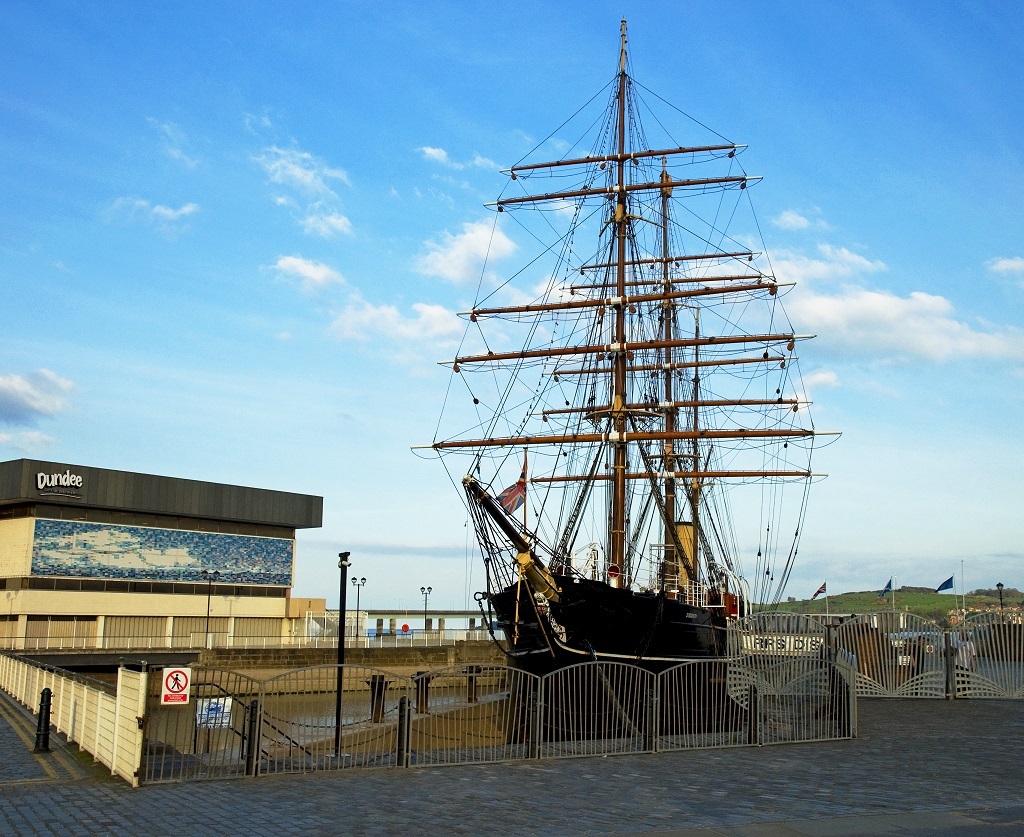
The Discovery, Captain Scott’s ship on his expeditions to Antarctica, is berthed in Dundee
If the city wasn’t faring well, then neither was my education. First of all I was taught by the Marist Brothers, which I loved, but when we moved I found myself at St Michael’s Junior Secondary School. There were some great people who helped me, teachers who could see I was a fish out of water. They recognised that the system actually wasn’t going to cater for someone like me who was such an oddball. I just didn’t fit into the mould.
I was in a special class called 1D4 and it was a mixture of people who were probably slightly gay or autistic or deeply criminal. We sort of all bunched together. It was a good bunch of guys but I was with some head bangers, some really dangerous people. Quite a lot of them ended up in prison. I was in danger of falling through the cracks too, but I didn’t because my arms are too wide.
Fortunately, where many people had nothing to sustain them, I had something that dominated my life. Growing up, my playground was Arthurstone Terrace, the foundry where I played and the church where I tried and failed to be an altar boy, but my two cinemas were my real temples – the Royal and the Broadway – and I’d go between the two. From an early age I’d spend all my time in those cinemas, and I don’t ever remember not wanting to be an actor.
Almost every day I would escape into the cinema and Greens Playhouse. I’d plonk from school – that’s Dundonian for playing truant – and remember watching James Dean in Giant. I’d go down there in the afternoon and lose myself: I remember waking up once in the cinema at four in the morning, and then running along the high street.
There used to be a TARDIS there and this voice boomed out: ‘Where are you going laddie?’ I said: ‘I’m going home sir, I fell asleep in the pictures’. He took me home; I was only about nine.
I joined the Old Rep on Nicholls Street and got a job as assistant to Bunty Kidd at 15, and was there until I was 17. I started off shifting sets, putting up posters, washing the stage every evening, carrying the takings to the bank. Then I started getting small parts, which got to be bigger parts – such as the paper boy in Picnic and Joseph in Dover Road. I’d spend all my time in the theatre and often I’d sleep there because we’d hit bottom dollar in terms of poverty.
My mother was out of Liff by now but she was a changed woman. Before the electric shock treatment she was quite a short, round, chubby woman, but when she came out she was down to about six stone and her short-term memory was shot: initially she couldn’t even remember me and couldn’t recall anything from before the trauma of dad’s death.
Times were very tough then. Sometimes her pension would be spent by Thursday so we had no money at all. I’d go to the chipper across the road and I’d get a bag of batter bits from the back of the chip pan and that would be our dinner until the Friday.
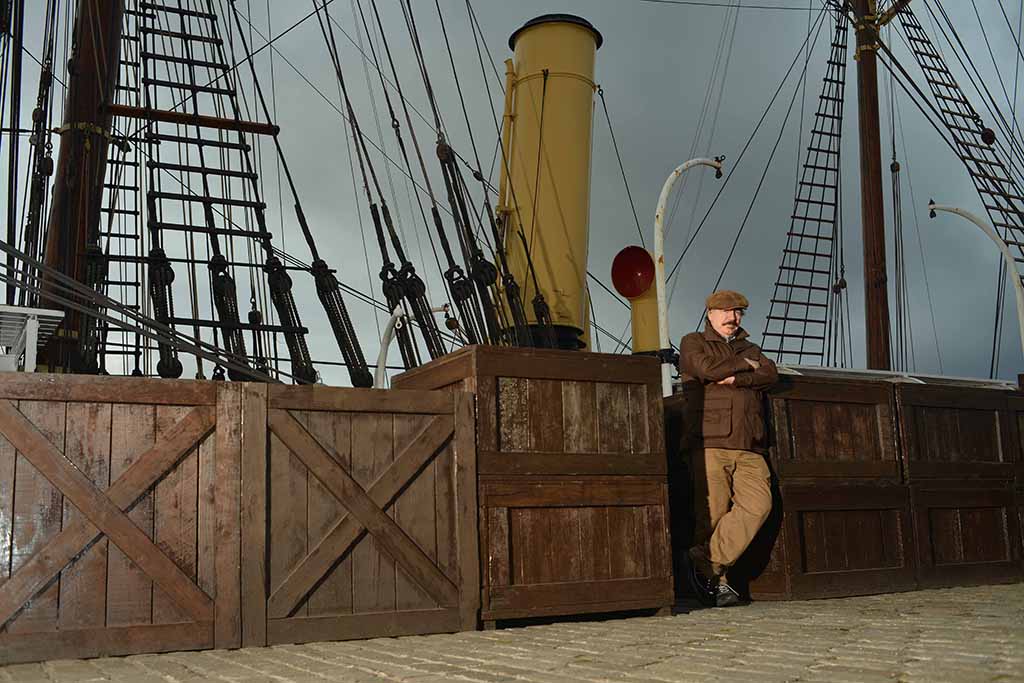
Brian Cox is proud of his Dundee heritage
In many ways the Rep was my home, and I’d often sleep there. It was down by the old Overgate, surrounded by the old buster stalls, the steeples and it was all quite medieval. There were these little alleyways and these fantastic Italian shops – there was a big Italian community here because they had come to do the filigree work on the ceilings of the big houses.
Although there was real poverty in Dundee there were big houses because there was also real wealth: at one stage Strathearn Road in Broughty Ferry was the richest road in Europe because all the jute mill owners lived there.
My mother was a spinner in a jute mill. Like a lot of Dundonians, all my family were Catholic Irish immigrants. My paternal family came from Enniskillen in Northern Ireland and were itinerant tattie and berry pickers, but when the famine happened they came to work in the mills. Back then Dundee was known as ‘Shetown’ because in my great-granny’s generation 70 per cent of the workers in the jute mills were women.
Dundee is where the idea of the indolent Irish house husband comes from because the men were all farmers who suddenly didn’t have any land and nothing to do, so instead they would go to the boozer and pour gut-rot whisky down their necks.
That’s one of the reasons why we had a Temperance MP in 1922 when the city elected prohibitionist Edwin Scrymegeour instead of Winston Churchill, who had been our MP.
People here didn’t like the fact that he changed parties while he was our MP, which made him really unpopular. Churchill was a victim of the fact that Dundee was particularly affected by the ideas of the Scottish Enlightenment, such as the secular society and a resistance to deference; we’ve always been instinctively egalitarian and fair-minded.
Despite the popular idea of the indolent Irish husband, there was relatively little sectarianism in Dundee, especially compared to Glasgow, where life was very hard indeed for Catholics. That said, Dundee United is a Catholic club, and even in Dundee there were some hangovers from that attitude, which saw the Irish as the blacks of Scotland.
Generally, though, there’s a wonderful mixture of Irish and Scot in Dundee (there’s also a community of Jews, who’d booked to go from Lithuania to New York, but were put off in Dundee and told that they’d arrived!). Unlike the Glaswegians we all lived together in a nonsectarian way. My pet theory is that this is partly because it’s drier here and the light is fantastic so it’s part of the culture to be outside all day.
As a kid I’d get up at six or seven o’clock on a summer’s day and you’d be straight out and then not back ‘til 11 o’clock in the evening. Because of where we are on the coast it’s amazing, especially the beaches down at Broughty Ferry. We had a little hut on the beach at Lucknow and would spend all day there.
Another key to Dundee’s collective psyche was that it was a port. The river gives a sense of freedom: you can either take it or not, but you’re not locked in. Of course you got days when you couldn’t see it because the haar came down but then it lifted and everything was so clear. It’s like Los Angeles after the rain; it’s like ‘oh my God what a beautiful place’. I never mind the haar; in fact I think it’s really beautiful.
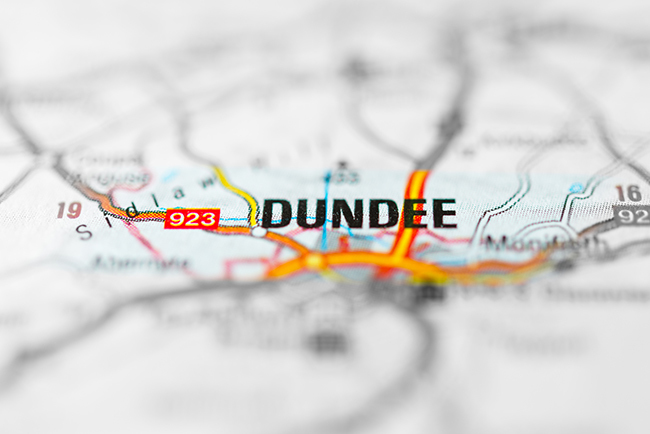
Dundee has changed so much over the years
I remember feeling, even as a young lad, that Dundee is very much part of me because of the river. The fact I could always see the Tay meant this was my world: what lay the other side of the Tay was the unknown, and I was desperate to get out there.
That desperation increased during my teenage years because they coincided with a highly corrupt socialist Labour town council in the fifties. They tore the heart out of the city, and my love affair with the town changed when they butchered Dundee. I really began to hate the place and hate the people who ran it, and this ambition I’d always had to get away became much stronger.
One particular act of cultural vandalism summed it all up for me. It was either General Monk or General Wade’s house at the bottom of Reform Street, and an old carpenter I knew told me that in there was an amazing old staircase that went from top to bottom of the house and was made from one tree – they just ripped it out and burned it. I felt so bad about what was being done to my city that when I started driving I couldn’t bring myself to drive through the middle of the city, I’d go around the outside so that I didn’t have to see the devastation, see what they’d done to the Overgate, the Angus Hotel, to buildings that I loved.
The way it had been replaced by that sixties architecture was horrific. It’s been hard for me, which is why I’m now a patron of the Dundee Heritage Trust.
It’s particularly galling when you realise what Dundee might have become. If you go to the Queen’s Hotel you’ll find the original Patrick Geddes drawings for his new Dundee, which were drawn about 1910. The Caird Hall is the only building that was actually built. It was like St Petersburg and it was to be a big waterfront city. It never happened because the city was just too industrial.
The Rep burnt down on my 17th birthday in 1963. That was in June but I didn’t start at drama school until the September so I needed to work and did so at the Palace, which was a variety theatre. The glory days of variety were over by then, but the Palace still had performances on a Saturday and midweek, and would fill in with boy bands – I remember having to look after Chick Murray.
By 17, I resented the city very much and was running away from it. I left for the London Academy of Music & Dramatic Art rather than Glasgow because I’d always had this thing about Glasgow: I discovered later on that my great-grandfather McCann had such a rough time in Glasgow that he ended up going mad and dying in Gartcosh asylum having been in the poorhouse, so I think that aversion to Glasgow, which I’m now over, is in my DNA.
Coming back to Dundee from London, the city was still in a mess right through the sixties into the Seventies. Still, no matter what they do to the buildings, the spirit of the city has remained unbroken because the city is its people and they haven’t changed at all.
Coming back, I was struck by the Dundonian wit and humour: there was a big difference between this city and the rest of Scotland because ours is a much more surreal humour that’s not as based on oppression. It’s based on making the best of things, so your fantasy world is boundless.
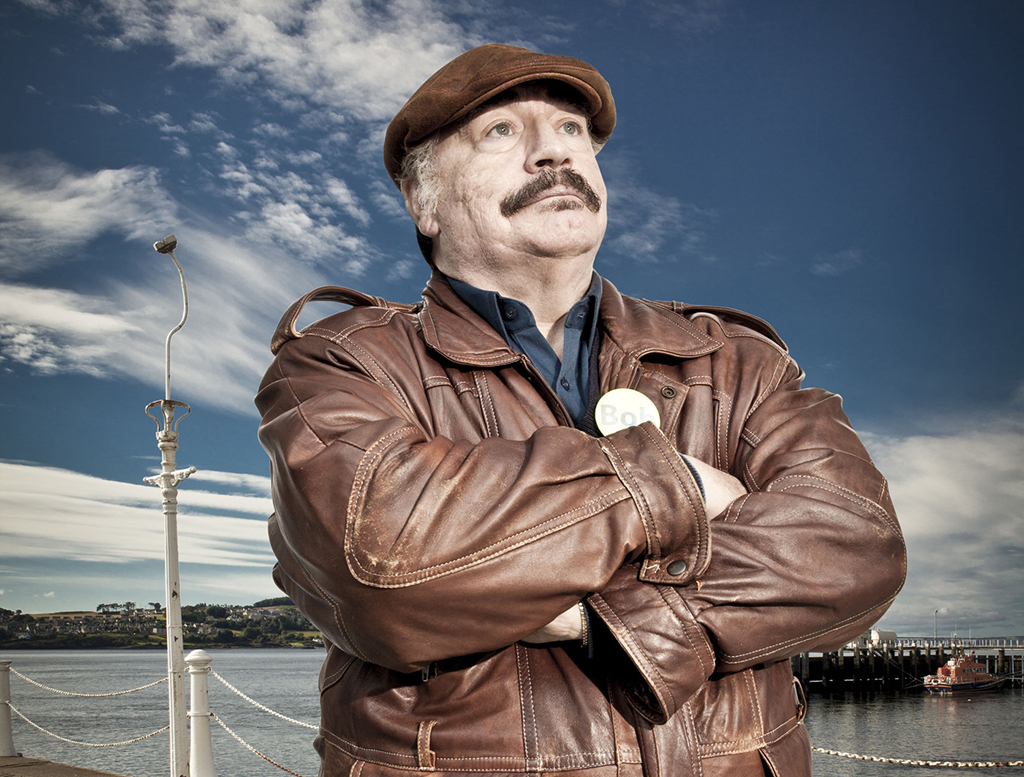
Brian Cox as Bob Servant(Photo: BBC/Euan Myles)
The character I’m playing at the moment is very typical of that kind of humour. When I first heard about the Bob Servant thing, about this kid from Broughty Ferry called Neil Forsyth who was writing this stuff, I had a slightly patronising attitude. I didn’t even prepare, we did the radio programme and I couldn’t get through it cause I was pissing myself laughing because it was so funny and I realised it was gold. It helped that my brother Charlie, a real character who died a couple of years ago, was just like Bob Servant, even if Charlie was a little less affluent.
The ironic thing about playing Bob Servant was that I had to recreate the Dundonian accent I did so much to lose when I moved to London. Fifty years ago I had a Dundonian accent you could cut with a knife until a voice coach called Kristin Linklater, the sister of Magnus Linklater [former editor of The Scotsman newspaper], completely remodelled my voice.
Over the years I’ve increasingly begun to appreciate the fortitude of Dundee and the sense it was surviving despite being written off so many times as a city. My election as rector of the university, which is a fantastic resource, in 2010 has brought me even closer to the city.
There are still problems, such as the blight of heroin, but I’ve seen this incredible cultural awakening that has been encapsulated in the coming of the V&A, which is a huge thing.
The thing about the city is that it is like the phoenix from the ashes. On a personal level, that journey kind of mirrors my own fortunes; the good moments, the bad moments, the rejections. I feel the city and I are very in harmony with one another in terms of our ups and downs. I feel at home here.
TAGS

